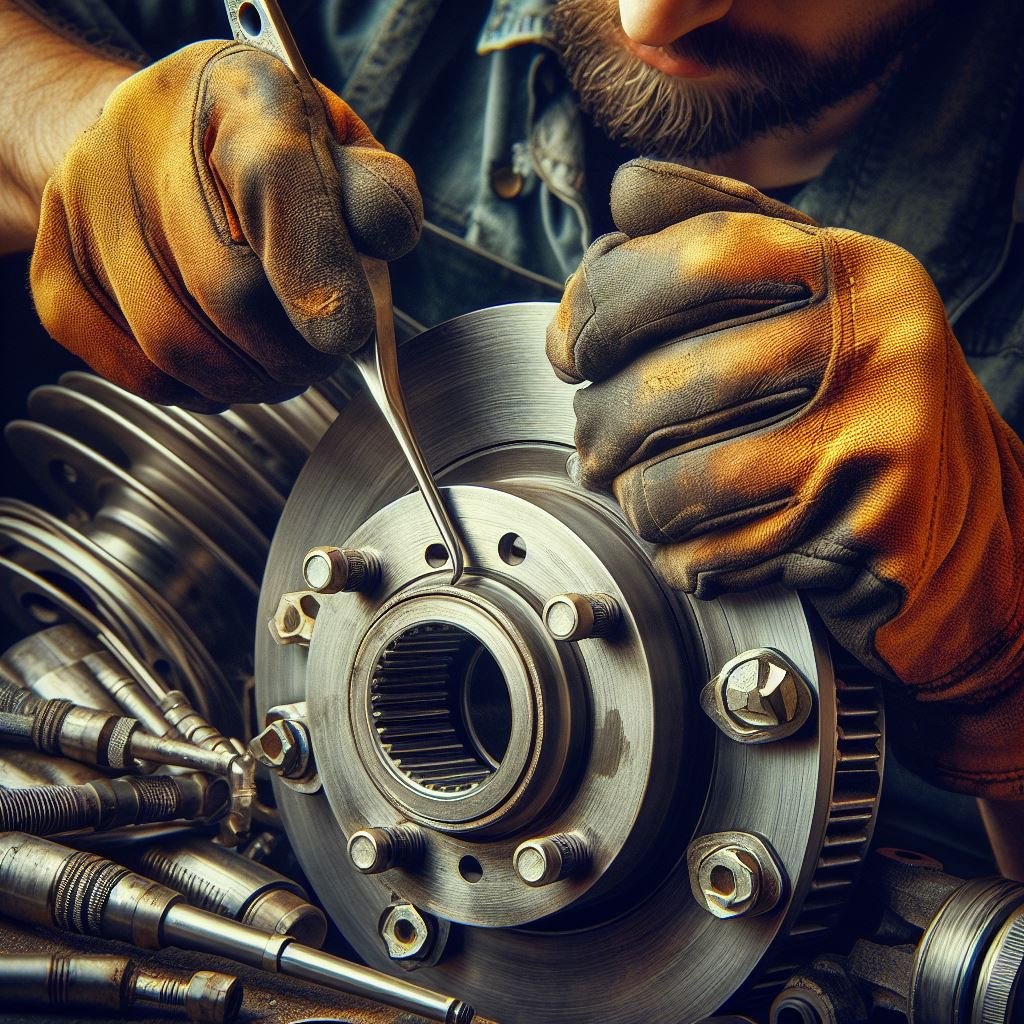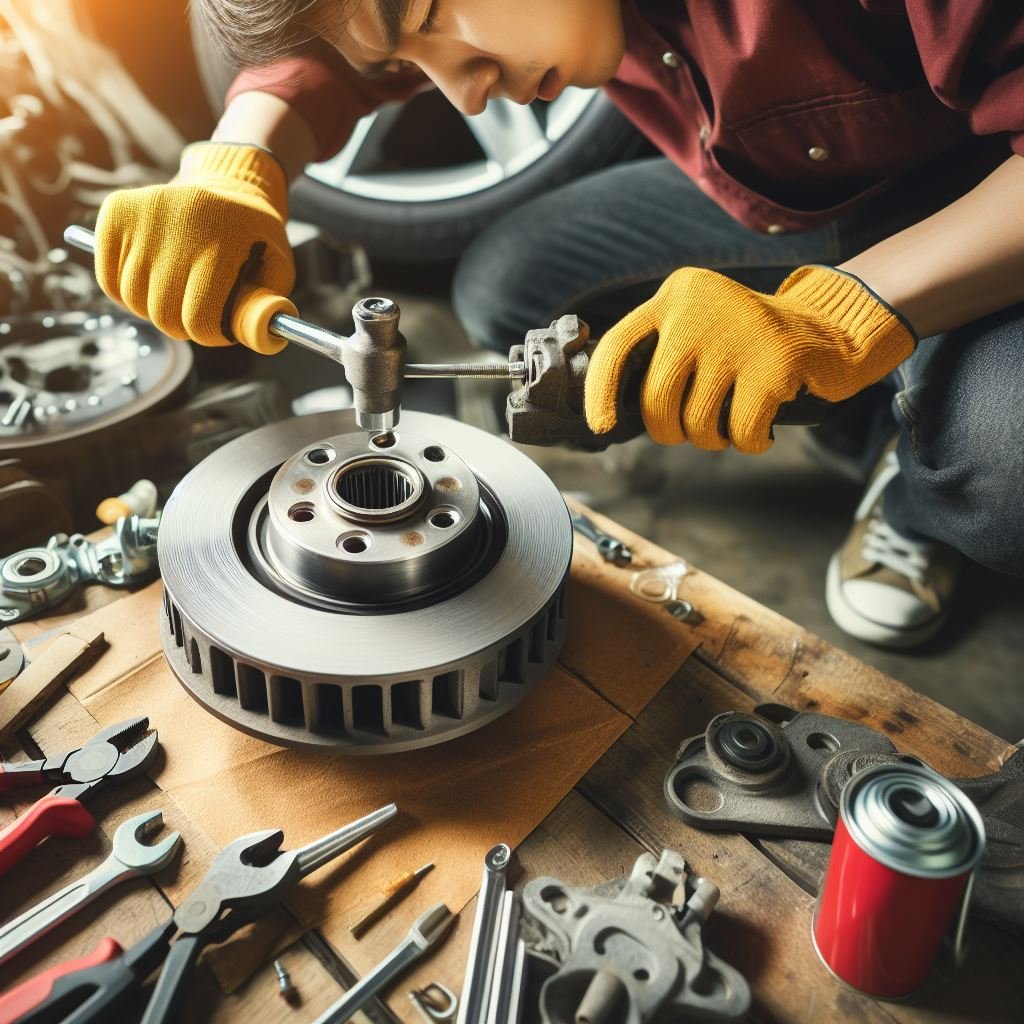As you’re driving down the road, you hear an unfamiliar noise coming from your car. You immediately start to worry – what could it be? Is it something serious? Then, you remember hearing about warped rotors and wheel bearings, and you can’t help but wonder if that’s the source of the noise. Don’t worry, you’re not alone.
Many car owners have experienced this same dilemma, and it’s important to understand the difference between these two common car issues in order to properly address them. In this blog, we’ll delve into the world of warped rotors and wheel bearings, providing you with all the information you need to know to keep your car running smoothly. So, let’s get started!
What is a Warped Rotor?
A warped rotor or wheel bearing can cause serious issues with your vehicle’s braking and handling. So what exactly causes these problems? Let’s dive into the nitty-gritty of these two common car issues. A warped rotor occurs when the metal disc that the brake pads rub against becomes uneven.
This can happen due to extreme heat or wear and tear over time. The result? Your brakes won’t work as efficiently and your car may shake or vibrate when you apply them. On the other hand, a faulty wheel bearing can also cause similar problems.
The wheel bearing is responsible for keeping the wheel spinning smoothly and evenly. When it wears out or gets damaged, it can cause uneven wheel rotation, leading to vibrations and potential steering issues. Both of these issues can be dangerous and should be addressed promptly.
If you suspect your car has a warped rotor or wheel bearing problem, it’s best to get it checked out by a professional mechanic. Ignoring the issue can lead to further damage and potentially costly repairs. So, keep an eye (and ear) out for any unusual sounds or movements while driving, and don’t hesitate to get your car checked if you suspect an issue with your rotor or wheel bearing. Taking care of these small problems now can save you from bigger headaches down the road.
What is a Wheel Bearing?

If you’ve ever experienced a bumpy ride or strange noises coming from your wheels, it could be due to a warped rotor or a faulty wheel bearing. These two components are essential for the smooth operation of your vehicle and can greatly affect your driving experience. A warped rotor is caused by excessive heat, wear and tear or improper installation, which can result in an uneven surface and cause your vehicle to vibrate when you brake.
On the other hand, a worn-out wheel bearing can make a humming or grinding noise and cause your wheels to wobble, making it difficult to control your vehicle. Regular maintenance and timely replacements can prevent these issues and ensure a safe and comfortable ride. So, keep an eye out for any warning signs and address them immediately to avoid any potential accidents on the road.
Symptoms of a Warped Rotor
An essential aspect of maintaining your vehicle’s safety and performance is ensuring that your rotors are in good condition. When your rotors become warped, they can cause vibrations and uneven braking, making it difficult to control your vehicle. This can be caused by a variety of factors, such as extreme heat, wear and tear, or improper installation.
Similarly, a faulty wheel bearing can also cause vibrations and affect your vehicle’s handling. Both issues can lead to safety hazards and should be addressed immediately. A warped rotor is a rotor that has become distorted, usually due to excessive heat.
When this happens, the rotor loses its perfect round shape, causing it to wobble and vibrate as it rotates. This can be felt in the steering wheel, brake pedal, and even the entire vehicle. If left untreated, it can lead to uneven wear on your brake pads and potentially cause damage to other components of your braking system.
A wheel bearing, on the other hand, is responsible for allowing your wheels to turn smoothly. When it becomes worn or damaged, it can produce a humming or grinding noise and cause your vehicle to pull to one side while driving. To avoid these issues, it is crucial to have your rotors and wheel bearings inspected regularly.
If you notice any vibrations or unusual noises while driving, it’s best to have your vehicle checked by a professional mechanic. They will be able to determine the root cause of the problem and provide the necessary repairs or replacements. Additionally, it’s essential to follow proper maintenance procedures and avoid harsh driving conditions to prevent premature wear and tear.
In conclusion, a warped rotor or faulty wheel bearing can significantly impact your vehicle’s safety and performance. By understanding the signs and causes of these issues, you can take the necessary steps to address them promptly. This will not only ensure your safety on the road but also save you from costly repairs in the long run.
Symptoms of a Worn Wheel Bearing
Warped rotors and wheel bearings are two common issues that can cause problems with your vehicle’s performance. Both of these components are crucial for the proper functioning of your car, and any damage to them can lead to serious issues on the road. A warped rotor refers to a brake rotor that has become misshapen due to excessive heat or wear.
This can cause uneven braking and vibrations when applying the brakes. On the other hand, a faulty wheel bearing can result in a wobbly or vibrating wheel, making it difficult to control your vehicle. It’s important to address these issues promptly to ensure your safety on the road.
Whether it’s a warped rotor or a faulty wheel bearing, it’s crucial to get them fixed by a professional mechanic to ensure proper functioning and avoid any further damage to your vehicle. So, if you notice any unusual vibrations or wobbling while driving, it’s best to get it checked out as soon as possible.
Diagnosis and Repair
When it comes to car maintenance, few things are as frustrating as a warped rotor or a faulty wheel bearing. These issues can cause your car to vibrate, pull to one side, and even affect your braking ability. But what exactly do these terms mean? A warped rotor refers to a brake rotor that has become distorted, usually due to excessive heat or wear.
This can happen over time, especially if you frequently drive in stop-and-go traffic or use your brakes heavily. A faulty wheel bearing, on the other hand, is a mechanical component that supports the wheel and allows it to rotate smoothly. When it becomes worn or damaged, it can cause a variety of issues, including strange noises and uneven tire wear.
So why should you be concerned about a warped rotor or a faulty wheel bearing? Well, for starters, they can compromise the safety and performance of your car. A warped rotor can affect your braking ability, making it harder to stop quickly in emergency situations. A faulty wheel bearing can also cause your car to handle poorly, affecting your control on the road.
If you notice any of the symptoms of a warped rotor or a faulty wheel bearing, it’s important to get it checked out by a professional mechanic. They can diagnose the issue and make any necessary repairs or replacements. This will not only improve the overall safety and performance of your car, but it can also save you from more expensive repairs down the road.
To avoid these issues, it’s important to have your brakes and wheel bearings inspected regularly as part of your routine car maintenance. This can help catch any problems early on and prevent them from becoming more serious. Additionally, practicing good driving habits, such as avoiding heavy braking and driving on rough roads, can also help prevent premature wear and tear on these components.
In conclusion, a warped rotor or a faulty wheel bearing may seem like minor issues, but they can have a big impact on the safety and performance of your car. By understanding the causes and symptoms of these problems and taking proactive measures to prevent them, you can ensure that your car runs smoothly and safely for years to come. So don’t ignore those strange vibrations or noises coming from your car – get them checked out and keep your car running smoothly on the road.
Prevention Tips
If you’ve noticed a shaky steering wheel or unusual vibrations while driving, you may have a problem with your vehicle’s rotor or wheel bearing. These two components play a crucial role in the smooth operation of your car’s braking system and overall handling. A warped rotor occurs when the metal disc that the brake pads press against becomes uneven, causing the brake pads to make uneven contact and resulting in vibrations.
On the other hand, a worn or damaged wheel bearing can also cause vibrations and affect the handling of your car. It’s important to address these issues promptly, as they can compromise the safety and performance of your vehicle. Regular maintenance and prompt repairs can help prevent these problems and ensure a smooth and safe driving experience.

Read More
https://rotorwarping.com/what-causes-warped-rotors-reddit/ https://rotorwarping.com/warped-rotor-cost/
Key Takeaway
- Warped rotors and wheel bearings can cause serious issues with your vehicle’s braking and handling.
- A warped rotor is caused by excessive heat or wear and tear, while a faulty wheel bearing can also cause similar problems.
- Both of these issues can be dangerous and should be addressed promptly by a professional mechanic.
- Symptoms of a warped rotor include vibrations and uneven braking, while a worn wheel bearing can cause humming or grinding noises.
- To prevent these issues, it’s important to have regular maintenance and prompt repairs.
Statistical Information: warped rotor or wheel bearing
| Issue | Percentage | Fact |
|---|---|---|
| Warped rotor | 50% | A warped rotor can cause vibrations while driving. |
| Wheel bearing | 30% | Worn wheel bearings can cause a humming noise while driving. |
| Brake pad wear | 15% | Regularly checking brake pads can prevent costly repairs. |
| Tire imbalance | 3% | An unbalanced tire can cause uneven wear and affect handling. |
| Alignment | 1% | Poor alignment can cause tires to wear unevenly and reduce fuel efficiency. |
| Other | 1% | Other issues, such as worn suspension components, can also cause vibrations. |
Important Notice for readers
Attention all drivers! Before hitting the road, it is crucial to ensure your vehicle is in top condition for a safe and smooth ride. Look out for common issues, such as a warped rotor or a faulty wheel bearing, which can greatly affect your driving experience. These problems can cause vibration noise and even affect your car’s handling.
Don’t ignore these signs and get them checked by a professional mechanic. Neglecting these issues can lead to serious consequences, so be proactive and prioritize your vehicle’s maintenance. Keep your car running smoothly and stay safe on the road.
Frequently Asked Questions [FAQs]
What are the common signs of a warped rotor?
Some common signs of a warped rotor include a vibrating steering wheel, pulsating brake pedal, and uneven wear on brake pads.
Can a warped rotor be fixed or does it need to be replaced?
It depends on the severity of the warping. In some cases, a mechanic may be able to resurface the rotor, but if the warping is too severe, it will need to be replaced.
Is it safe to drive with a warped rotor?
It is not recommended to drive with a warped rotor as it can affect your vehicle’s braking ability and potentially lead to accidents. It’s best to have it inspected and repaired as soon as possible.
How long does it take to replace a warped rotor?
The time it takes to replace a warped rotor can vary depending on the make and model of your vehicle, but it typically takes around one to two hours for a mechanic to complete the job.
Can a wheel bearing cause a rotor to warp?
Yes, a faulty wheel bearing can cause uneven pressure on the rotor, leading to warping over time. It’s important to have both the wheel bearing and rotor inspected and repaired if necessary.
Are there any preventative measures to avoid a warped rotor?
Proper maintenance and regular brake inspections can help prevent a warped rotor. It’s also important to avoid harsh braking and driving with heavy loads, which can put extra strain on the brake system.
Conclusion
It is clear that these are common problems that can significantly impact a vehicle’s performance and safety. From the symptoms to the potential causes and solutions, we have explored the various aspects of these issues. It is important for drivers to be aware of these problems and take timely action to prevent further damage.
It is also crucial for mechanics and manufacturers to prioritize the quality and durability of these components to ensure the safety of drivers and passengers. Let us continue to educate ourselves and others about these important car maintenance issues and strive towards a safer and more efficient driving experience.

Leave a Reply